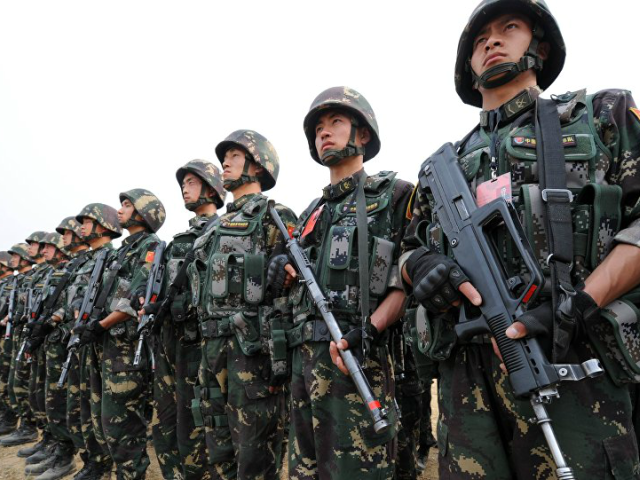Multiple media outlets have reported that Beijing is planning to send its elite special forces, known as the “Tigers of Siberia” and the “Night Tigers,” to support troops loyal to dictator Bashar al-Assad in Syria.
The reports speculate that China is particularly concerned with Chinese Uighurs fighting on behalf of the al-Qaeda-linked East Turkestan Islamic Movement (ETIM).
China has linked ETIM Uighur terrorists to many attacks on Chinese soil.
The original report appears to have surfaced in Dubai’s New Khaleej. The Middle East Monitor (MEMO) reports:
China is planning to send troops to Syria to aid President Bashar Al-Assad’s forces … the move comes as China becomes increasingly concerned with the presence of Islamic militants in the East Turkestan region, who have been sighted aiding opposition groups in Syria.
Last week, during a meeting with Syrian Presidential Advisor Bouthaina Shaaban, Chinese Foreign Minister Wang Yi praised the regime’s efforts at tackling the fighters from the Islamic East Turkistan Movement.
MEMO claims that the Chinese Ministry of Defence is planning to send two divisions—the “Tigers of Siberia” and the “Night Tigers”—from its Special Operations Forces to assist the Assad regime.
“This is not the first time Chinese troops have crossed into Syria; in 2015 the Syrian regime permitted some 5,000 soldiers to enter its territory as allied forces and stationed them in the Western region of Latakia,” notes the news outlet. “Chinese military advisors were also among the deployment, as well as naval and aerial assets.”
Telesur, a leftist South American outlet, also reported the prospective deployment, citing an announcement made by the Hmeimim Russian Military Base on the facility’s official Facebook page.
Russia has anticipated Chinese support for its ally Assad in Syria for years.
As veto-wielding powers of the United Nations Security Council, both Russia and China have repeatedly backed Syrian regime efforts.
Support from Russia and Iran turned the tide of the ongoing Syrian civil war in favor of dictator Assad.
As the Islamic State (ISIS/ISIL) suffers significant losses in the Middle East, al-Qaeda is growing stronger, particularly in Syria where it has reportedly set up the conditions to establish an Islamic emirate.
Al-Qaeda is believed to be stronger in Syria in any other country, including its long-time home base in the Afghanistan-Pakistan region.
Many ETIM-affiliated Uighur (or Uyghur) jihadists have been fighting under the banner of the Taliban and its ally al-Qaeda in the Afghanistan-Pakistan region for over a decade, but in recent years some Chinese Islamic extremists have also joined ISIS.
Jihadists from China’s oppressed Uighur minority who have joined both al-Qaeda and its rival ISIS have vowed to attack the Asian giant.
While many of them remain in Asia, others have traveled to Iraq and Syria to join groups affiliated with al-Qaeda and the Islamic State (IS).
“ETIM’s members are part of the Turkestan Islamic Party fighting with the Al-Qaeda umbrella group in Syria, but other Uighurs have joined IS in Syria and Iraq, and still others have joined local terror groups in Indonesia,” recently reported the Hague-based International Center for Counter-Terrorism (ICCT) think-tank.
The Islamic East Turkestan Movement reportedly has an estimated 2,500 jihadists operating in Syria under the country’s al-Qaeda affiliate, Hayat Tahrir al-Sham (HTS).
Overall, there are “around 4,000-5,000 Xinjiang jihadists” waging jihad on behalf of various Islamic extremist groups in Syria alone, revealed Amb. Imad Moustapha, the Syrian envoy to Beijing, this year.
The Muslim-majority Xinjiang autonomous region is home to the largest concentration of the country’s Uighur minority.
As China’s largest province, Xinjiang borders Afghanistan and Pakistan-occupied Kashmir (POK), a Muslim-majority territory claimed by Beijing, Islamabad, and New Delhi.
China has long expressed concerns about the growing terrorist threat it is facing, stemming from Pakistan and to a lesser extent Afghanistan.
In late 2015, China adopted its first-ever anti-terrorism law that allows the country’s military to participate in counter-jihad operations abroad.
Alexandr Larin, senior research fellow at the Moscow-based Institute of Far Eastern Studies, indicated to independent Russian newspaper Svobodnaya Pressa in 2015 that that Beijing’s One Belt, One Road (OBOR) initiative—also known as the new “Silk Road”—would end up forcing China to join anti-terrorism efforts in the Middle East.
The ambitious $3 trillion OBOR project is expected to run through Middle Eastern countries.

COMMENTS
Please let us know if you're having issues with commenting.